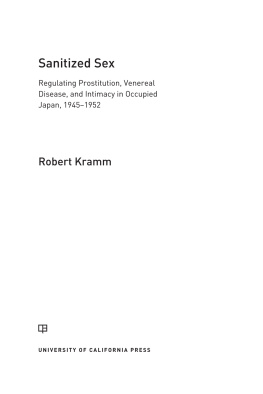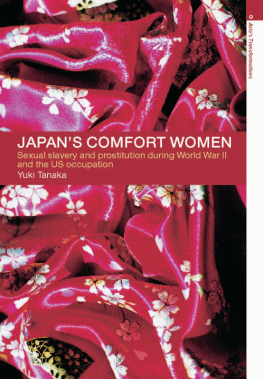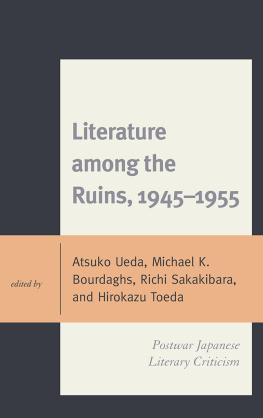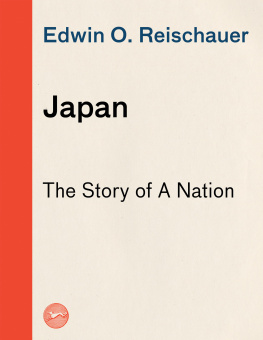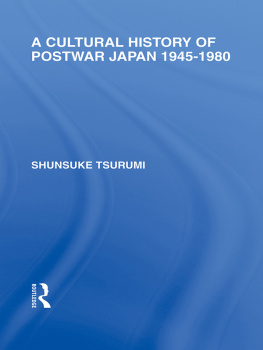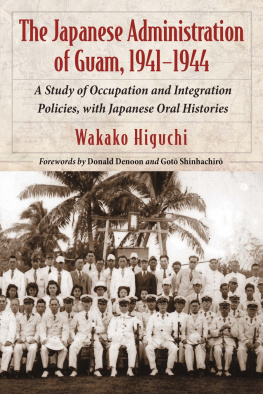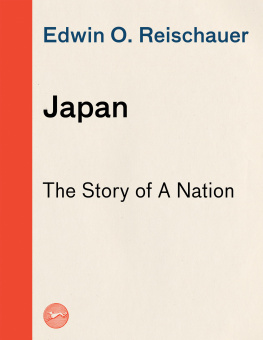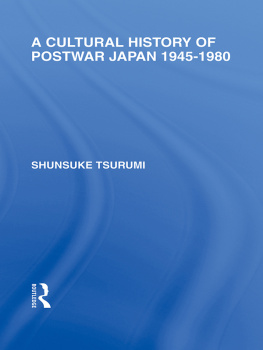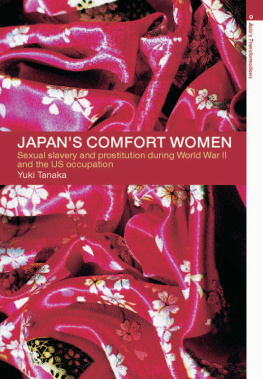Sanitized Sex
ASIA PACIFIC MODERN
Takashi Fujitani, Series Editor
Erotic Grotesque Nonsense: The Mass Culture of Japanese Modern Times, by Miriam Silverberg
Visuality and Identity: Sinophone Articulations across the Pacific, by Shu-mei Shih
The Politics of Gender in Colonial Korea: Education, Labor, and Health, 19101945, by Theodore Jun Yoo
Frontier Constitutions: Christianity and Colonial Empire in the Nineteenth-Century Philippines, by John D. Blanco
Tropics of Savagery: The Culture of Japanese Empire in Comparative Frame, by Robert Thomas Tierney
Colonial Project, National Game: A History of Baseball in Taiwan, by Andrew D. Morris
Race for Empire: Koreans as Japanese and Japanese as Americans during World War II, by T. Fujitani
The Gender of Memory: Rural Women and Chinas Collective Past, by Gail Hershatter
A Passion for Facts: Social Surveys and the Construction of the Chinese Nation-State, 19001949, by Tong Lam
Redacted: The Archives of Censorship in Transwar Japan, by Jonathan E. Abel
Assimilating Seoul: Japanese Rule and the Politics of Public Space in Colonial Korea, 19101945, by Todd A. Henry
Working Skin: Making Leather, Making a Multicultural Japan, by Joseph D. Hankins
Imperial Genus: The Formation and Limits of the Human in Modern Korea and Japan, by Travis Workman
Sanitized Sex: Regulating Prostitution, Venereal Disease, and Intimacy in Occupied Japan, 19451952, by Robert Kramm
Sanitized Sex
Regulating Prostitution, Venereal
Disease, and Intimacy in Occupied
Japan, 19451952
Robert Kramm

UNIVERSITY OF CALIFORNIA PRESS
University of California Press, one of the most distinguished
university presses in the United States, enriches
lives around the world by advancing scholarship in the
humanities, social sciences, and natural sciences. Its
activities are supported by the UC Press Foundation and
by philanthropic contributions from individuals and
institutions. For more information, visit www.ucpress.edu.
University of California Press
Oakland, California
2017 by Robert Kramm
Library of Congress Cataloging-in-Publication Data
Names: Kramm, Robert, author.
Title: Sanitized sex : regulating prostitution, venereal
disease, and intimacy in occupied Japan, 19451952 /
Robert Kramm.
Description: Oakland, California : University of
California Press, [2017] | Series: Asia Pacific Modern;
15 | Includes bibliographical references and index. |
Identifiers: LCCN 2017013716 (print) | LCCN 2017016883
(ebook) | ISBN 9780520968691 (ebook) |
ISBN 9780520295971 (cloth : alk. paper)
Subjects: LCSH : ProstitutesLegal status, laws, etc.
JapanHistory20th century. | JapanHistory
Allied occupation, 19451952Social aspects. |
Sexually transmitted diseasesJapanPrevention
History20th century. | Sex-oriented businesses
JapanHistory20th century. | SoldiersSexual
behaviorJapan. | SoldiersSexual behaviorUnited
States.
Classification: LCC HQ 247. A 5 (ebook) | LCC HQ 247. A 5
K 73 2017 (print) | DDC 363.4/409520904dc23
LC record available at https://lccn.loc.gov/2017013716
Manufactured in the United States of America
26 25 24 23 22 21 20 19 18 17
10 9 8 7 6 5 4 3 2 1
For Pauline
Contents
Illustrations
Acknowledgments
Many people have supported me along the way of conceptualizing, writing, and finishing this book. It derives from my doctoral dissertation submitted to ETH Zurich in 2015, and I would like to thank my thesis advisers Harald Fischer-Tin, Tak Fujitani, and Martin Dusinberre for the guidance, encouragement, and constructive critique they offered me over the years. I am extremely grateful to You Jae Lee at the University of Tbingen, who gently guided me through the early stages of my doctoral research and also provided strong personal and institutional support to accomplish major parts of my archival quests. I owe special thanks to Sebastian Conrad, Alf Ldtke, John G. Russell, Jie-Hyun Lim, Umemori Naoyuki, Mire Koikari, David Arnold, Thoralf Klein, Michael Kim, David Courtwright, Jrgen Martschukat, Henry Em, Todd Henry, Sarah Kovner and Andre Schmid, who all gave meknowingly and unknowinglyinvaluable comments and advice during various stages of this project and pointed me in directions that I could never have foreseen on my own.
At the archives I visited, I always received a warm welcome and I want to express my gratitude to all the archivists without whose assistance this book wouldnt have been possible. I especially want to thank Eric Vanslander at the National Archives in College Park, Maryland, who showed much patience in navigating me through finding aids and piles and boxes of records. His vast archival knowledge enabled me to discover hidden treasures. Sakaguchi Eiko, Amy Wasserstrom, and Kana Jenkins were of enormous help at the Prange Collection and the East Asia Collection at the University of Maryland, and they assisted and encouraged me to dig deeper in Japanese-language source material from the occupation period. Many thanks go also to Megan Harris from the Veterans History Project in the American Folklife Center at the Library of Congress, who provided me insights into firsthand occupiers narratives.
Numerous forums allowed me to present my thoughts and helped me to cope with my manifold concerns throughout the research for this project. At Waseda University, members of the Umemori-zemi were kind enough to listen to my initial and still incoherent research proposal, encouraging me to continueor rather: to start the projectand also gave me helpful advice. Sebastian Jobs, Bruce Dorsey, Woody Register, and Olaf Stieglitz kindly gave their attention to a preliminary draft of my very first chapter at a fascinating workshop on Uncertain Knowledge at the GHI, Washington, DC, and their illuminating comments boosted and structured my subsequent research. As the project proceeded, I became indebted to the members of the research group Korea and East Asia in Global History, 18402000 (based at the FU Berlin and funded by the Academy of Korean Studies) for including me in their workshops and talks, namely Nadin He, Jaekyom Shim, Sunho Ko, Tobias Scholl, and Hakjae Kim. I also owe a debt of gratitude to my former colleagues at ETH Zurich for the collegial environment that allowed for endless discussions of my research project. It was a comforting atmosphere in which to overcome those uncertainties inevitably connected to the at times seemingly unbearable process of writing a doctoral dissertation. In particular I would like to thank Judith Groe, Bernhard C. Schr, Vasudha Bharadwaj, Patricia Putschert, Snke Bauck, Miguel Kempf, Anna Mohr, Francesco Spring, Jana Tschurenev, Maria Framke, and Nikolay Kamenov, who read and reread chapters of my thesis, shared their insights, pointed me toward important literature, and helped me to organize my thoughts. Batrice Schatzmann-von-Aesch was an inestimable support in accomplishing administrative tasks and guiding me through the universitys bureaucracy during my work and graduation at ETH Zurich.
The Research Institute of Comparative History and Culture at Hanyang University in Seoul was my first postdoctoral stopover and provided a warm welcome and supportive environment that enabled me to revise my manuscript. Director Park Chan Seung, faculty members Kim Sang-Hyun, Lee Changnam, Kim Chung-kang, So Hyunsoog, Yang Hee Hong, and administrative assistant Hong Sunghee all helped me tremendously to keep focused. The Institute for Advanced Study at the University of Konstanz allowed me to finish my final revisions, and I would like to thank Fred Girod, Svenia Schneider-Wulf, and Felicia Afriyie for the institutional support.
Next page
